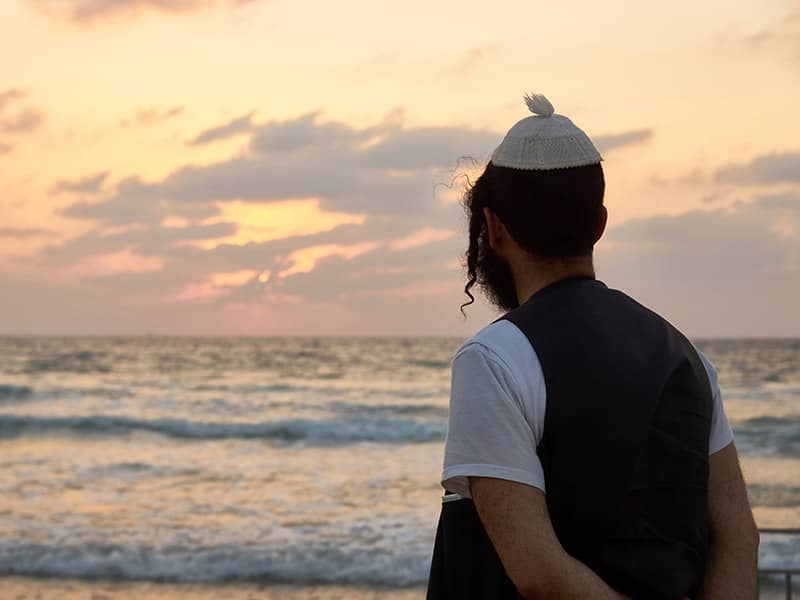The Seder begins with our declaration that all those who are hungry should come and eat. In fact, the invitation is traditionally made, not in the Hebrew of the rest of the Haggadah (the collection of stories, songs, and blessings that shapes the festive meal), but in Aramaic, the English of the early centuries of the Common Era. This was done so that anyone listening could understand the invitation and avail themselves of it. To that end, many people today make sure to speak these words in English and some even open their doors as they do so. But, of course, most of us would be pretty surprised, and perhaps even a little unnerved, if some stranger happened to take us up on our seemingly generous offer. So what's going on here?
Aside from the obvious lesson that we should all be opening our homes a bit more to those less fortunate than ourselves, we are also inviting ourselves to open our own hearts and minds. Feeding a stranger is relatively easy. For most of us, nothing could be more Jewish. Listening carefully to strange ideas, however, is less so. In a world increasingly shaped by litmus tests about everything from who should serve as the United States' representative to the United Nations, to which single issue qualifies someone to serve on the Supreme Court, from what counts as "authentically Jewish" to who has the right to march through Jerusalem declaring their love of Israel and the Jewish people, this opening ritual of the Seder challenges us to think more intelligently and to behave more inclusively.
Long before the Academy Award winning films "Guess Who's Coming to Dinner" and "Six Degrees of Separation," the rabbis who composed the Haggadah appreciated that many of life's most important questions are raised at the family table, and that raising them properly means including a wide range of guests and an even wider range of ideas. The real power of the invitation we extend as the Seder begins lies in asking those at the table not only to share our food, but also to share their opinions and their ideas with the rest of us, even those opinions and ideas with which we may strongly disagree.
How strongly might we disagree? Strongly enough that one of those imagined people who brings his ideas to our Seder table is actually called evil-rasha in Hebrew-by the Haggadah! And while we label this individual as evil, the Haggadah reminds us that he is regarded as a member of the family, one of our children, whose questions and opinions are to be taken seriously.
Most of us assume that upon finding evil in the world, our first response must be to destroy it. And while that may ultimately be necessary, it is not the first choice of Jewish tradition. Instead, we are told that anyone willing to take a seat at the table of Jewish life is part of our family. We learn from the rabbis that anyone willing to participate in a Jewish conversation, to ask a question, no matter how seemingly abhorrent, deserves our genuine consideration. Rather than shying away from declaring that evil is real, or insisting that our initial read of its presence demands a quick and harsh response, the rabbis empower us to make such determinations, while insisting that those so labeled still deserve the love and respect that mark all great family relationships.
In fact, according to a Hasidic teaching from Belz, that is why the person who maintains such disturbing, even misguided, ideas is called rasha in Hebrew. This three-letter word begins with the letter reish and concludes with the letter ayin, which together spell rah, evil. But in the middle of the word, we find the letter shin, symbolic of the Shekhina, the presence of God as a source of complete love and nurturing. Our challenge in listening to one we consider to be evil is to see through to the inner core of the question being asked, or the opinion being espoused, and to learn from it even if we never agree with it, to see that person as holy for being willing to ask their questions and share their ideas. Actually, such openness to others is the hallmark of the freedom that Passover celebrates, and affirms the dignity of each human being that slavery strips away.
This year, let's come to the Seder prepared to ask the toughest, smartest, and most interesting questions of the story, of each other, and of ourselves, and let's make it safe for everyone else gathered at our tables to do so as well. At your Seder, invite one or more people to ask what might be considered a rasha question-about Jewish identity, American politics, Israel, etc. After discussing what makes the question being posed a rasha question, try to locate the shin, the holiness, in that same question. Then consider how finding that wisdom effects your thinking about the issue at hand, the person asking the question, and the relationship between you and that person.
By asking such questions, and by hearing each other in such loving and respectful ways, we can create the kind of spiritual and intellectual communities we, and the rest of the world, so desperately need. By continuing this practice all year long, we can transform the world.

